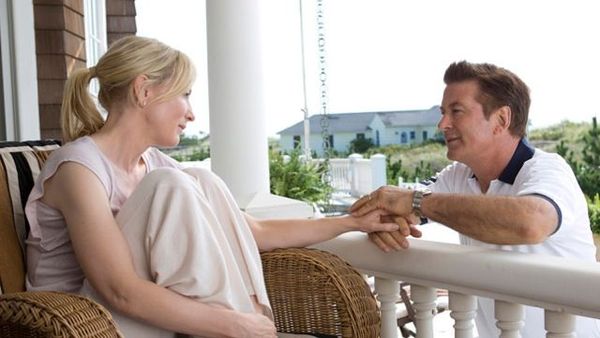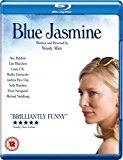Eye For Film >> Movies >> Blue Jasmine (2013) Film Review
Blue Jasmine
Reviewed by: Jeff Robson

Another year, another Woody Allen film, another reigniting of the “has he still got it?” debate – but at last, after what seems like several epochs of European-set films garnering mixed (and at best mediocre) reviews, the poet of urban angst has once again produced a real, 100% certified cracker.
Personally, I reckon if Blue Jasmine does nothing else except keep the carpers quiet for a bit it’s more than justified its existence. I always felt that it was worth applying what might be called the “Bob Dylan Dispensation” to Allen’s output – there’s enough sublime genius in the back catalogue to give its creator carte blanche to produce mediocrity for the rest of his life.

Unfortunately, like dear old Bob, Woody’s often seemed more than happy to exploit that dispensation to the full of late. So it’s a relief to report that Blue Jasmine has all the wit and insight of classics from his autumnal period like Hannah And Her Sisters or Crimes And Misdemeanors, as well as the odd zinger that could have come from one of the “earlier, funny ones” and a few new elements that suggest there’s plenty of life in the old hangdog yet.
It begins in classic Allen fashion, with Jasmine (Blanchett) haranguing the passenger in the next plane seat about the twists of fate that have reduced her from a seat at the top table of Manhattan’s upper set to a journey across country to live with her sister, a grocery clerk in San Francisco. Jasmine’s blithe self-absorption almost drives her fellow traveller mad – but bankruptcy, divorce and social ostracism haven’t prevented her from flying first class, or dumping her Louis Vuitton luggage for the terminally-put upon Ginger (Hawkins) to unpack when she arrives.
It soon becomes clear that she’s learnt nothing from the experience of watching her husband Hal (Baldwin) play around, lose their fortune (and many other people’s) through a Bernie Madoff-style fraud and eventually end up in jail. Everything in life is someone else’s fault and she saw nothing wrong in turning a blind eye to hubby’s dodgy dealing because it financed her gilded lifestyle – one she clearly expects to continue.
For Ginger, her sister’s arrival adds to an already overloaded life, as she struggles to bring up two sons on her own with no help from her abusive ex-husband (Clay), who lost what little money the family had by investing it in one of Hal’s get-rich-quick schemes. Her new boyfriend Chili (Cannavale) is constantly irritated by Jasmine’s presence and rightly assesses her as a very dependent personality who’ll feel entitled to leech off her sister while simultaneously looking down on her.
As the sisters rub up against each other more and more, it’s clear that jealousy and friction have been constants in their lives since childhood and proximity only makes things worse. But eventually Jasmine finds a job as a receptionist for a local dentist (Michael Stuhlbarg) and starts studying interior design. Her attempts to widen Ginger’s social horizons result in her meeting a sound engineer (Louis CK) who seems to offer more than Chili’s beer and sports lifestyle, while Jasmine begins a relationship with a recently widowed diplomat (Peter Sarsgaard).
He seems to offer everything Jasmine has lost – money, taste and stability. But the ghosts of the past are never too far away. Their return makes the audience vividly aware that Jasmine’s dependence on anti-depressants and habit of conducting self-absorbed monologues aren’t just amusing character tics but signs of a genuine mental health problem. And in trying to help the sister she still loves despite everything, Ginger is forced to confront truths and make choices in her own life...
As the film builds to a series of emotional confrontations, in which each character has to come to terms with the darkest elements of their past, and of their own personalities, Allen orchestrates scenes of genuine intensity and empathy. In the past I’ve often thought that, even in his best moments, there was something detached and analytical about the director’s insights into his characters. But here there’s a rawness and warmth that blends well with the usual shrewdness and wit, making it his most satisfying work in a long time.
He’s finally packed the travelling case away, but his keen eye for a great landscape shot hasn’t deserted him in the San Francisco scenes, which conjure up the city’s sea blue-tinged open spaces and its lively, slightly frayed, bohemian air. And the flashback depictions of Jasmine and Hal’s East Coast colour supplement lifestyle have just the right superficial but sumptuous seductiveness about them. A glorious, lush jazz score doesn’t stretch the Allen musical template much but provides a beautiful soundtrack and a barbed commentary on the gap between the characters' self-perception and reality.
And, of course, he can’t half direct actors well. Blanchett’s performance justifies all the hype and will surely garner an award or two, turning a character who could become a monstrous, annoying caricature into a rounded, believable human being; one who abandoned any pretence to a meaningful life in favour of wealth and status and has simply lost the emotional tools necessary to care about anyone but herself.
Hawkins, as her polar opposite, nails the accent perfectly and displays the same good-hearted strength of character that characterised her breakout role in Mike Leigh’s Happy-Go-Lucky. Baldwin has just the right dead-eyed sleekness as a human great white shark and Clay and CK (both better known as stand-ups, though from slightly different points on the PC spectrum) turn in sharp, understated performances as the none-too-reliable men dragging Ginger back into a painful past and distracting her from a possibly settled future.
Cannavale works well, too, with another role that could become a stereotype – the blue-collar “grease monkey” who wants the best for Ginger but only on his own terms. To be honest, the men in the film are a fairly unprepossessing lot and, whether by accident or design, Allen the cinephile has come close to recreating a Golden Age “women’s picture” – it’s not too much of a stretch to imagine Katharine Hepburn and Barbara Stanwyck in the two main roles, coping (or not) with what life throws at them in very different ways. There’s the occasional lapse into caricature for the sake of a good laugh (one character becomes very early Woody-esque, though to admittedly good effect) and the master’s touch is a little less sure (and a little bit patronising) when it comes to portraying the working class characters.
But, all in all, not just a return to form but a step forward. Not bad for your 44th movie in your 77th year. Then again, isn’t that the mark of a great director?
Reviewed on: 26 Sep 2013

















